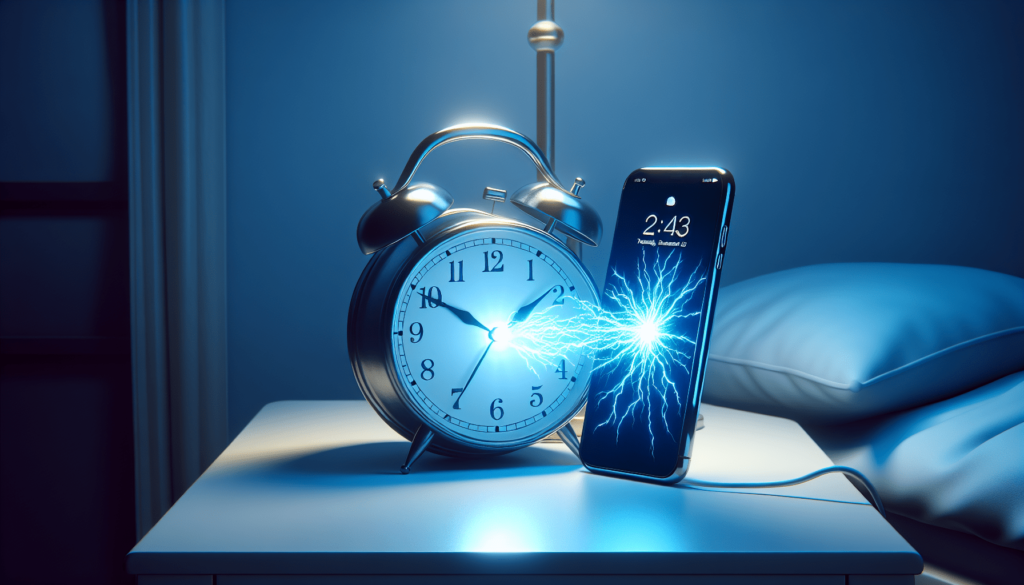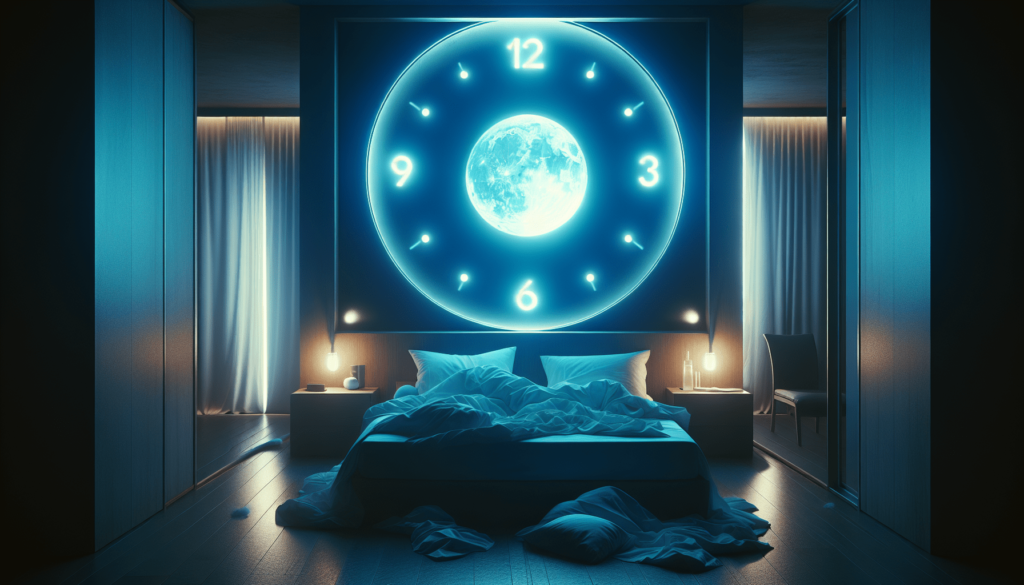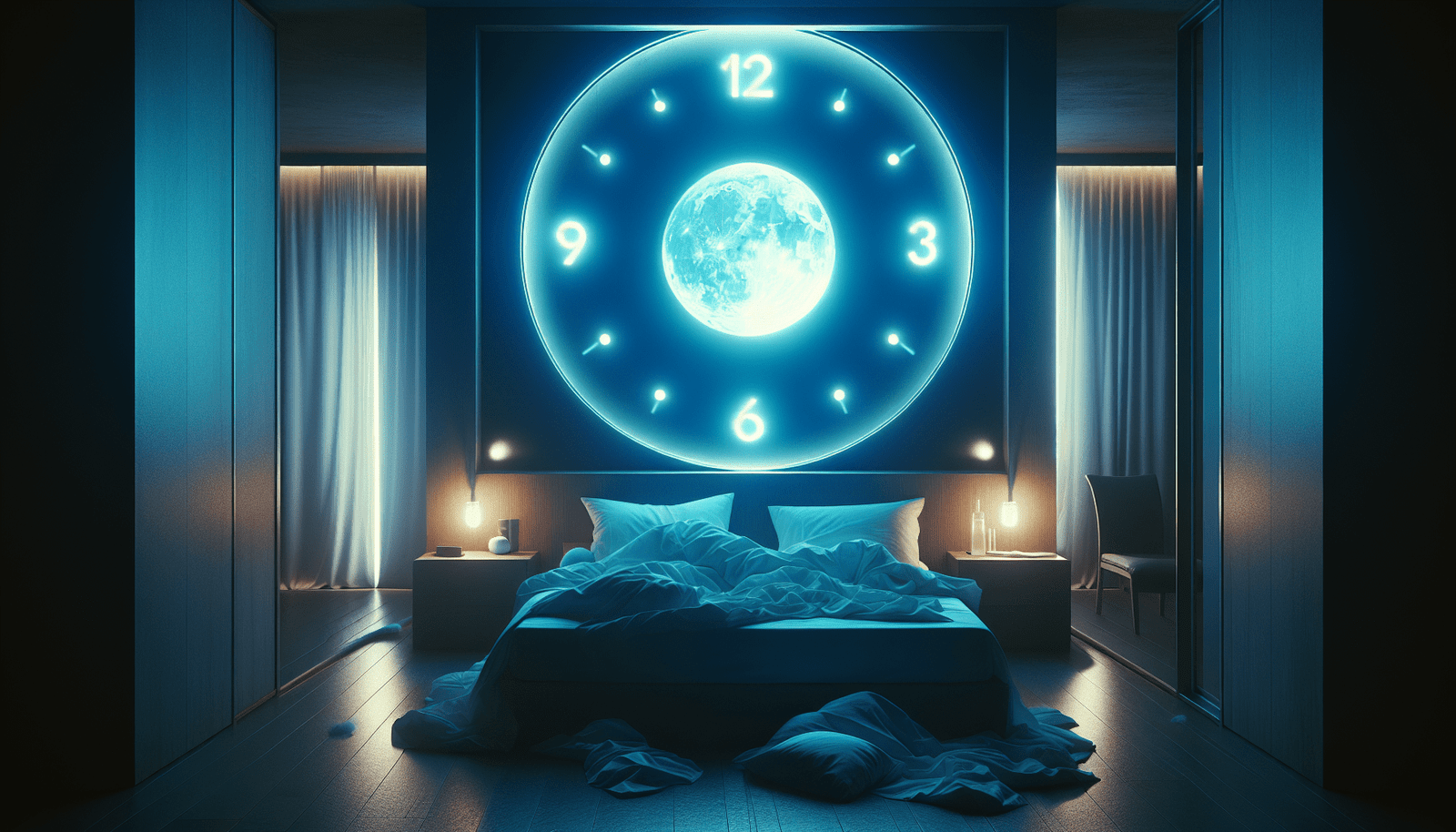We’ve all been there – scrolling through our phones or binge-watching our favorite TV shows right before bed. But have you ever wondered how this screen time actually impacts your sleep? Turns out, it’s not just a harmless habit. Research suggests that exposure to the blue light emitted by screens can disrupt your body’s natural sleep-wake cycle, making it harder for you to fall asleep and enjoy a good night’s rest. So next time you find yourself glued to your devices late at night, you might want to think twice about the impact it could be having on your precious sleep.

Blue Light Exposure
Effect on Melatonin Production
Exposure to blue light emitted by electronic devices such as smartphones, tablets, and laptops can have a significant impact on melatonin production. Melatonin is a hormone that regulates our sleep-wake cycle, also known as the circadian rhythm. When we are exposed to blue light, it suppresses the secretion of melatonin, making it more difficult for us to fall asleep.
Delayed Circadian Rhythm
Not only does blue light exposure affect melatonin production, but it also delays our circadian rhythm. Our circadian rhythm is influenced by external cues, such as light exposure, and helps regulate our sleep patterns. When we expose ourselves to blue light late at night, it confuses our internal clock, leading to a delay in our sleep-wake cycle. This can result in insomnia and difficulty falling asleep at night.
Disruption of Sleep Architecture
Decreased REM Sleep
REM (rapid eye movement) sleep is a crucial stage of the sleep cycle that is associated with dreaming and memory consolidation. Unfortunately, excessive screen time before bed can lead to a decrease in REM sleep. This can have negative consequences on our overall sleep quality and cognitive function.
Increased Wakefulness
The blue light emitted by screens can also increase our wakefulness, making it harder for us to transition into a state of sleep. Our brains are highly stimulated by the content we consume on screens, whether it’s social media, video games, or streaming services. This constant engagement can keep our minds active, preventing us from relaxing and falling asleep easily.
Impact on Sleep Quality
Subjective Sleep Quality
Subjectively, individuals who engage in screen time before bed often report poorer sleep quality compared to those who refrain from using electronic devices. The overstimulation and exposure to blue light can disrupt the natural sleep cycle and lead to a restless night’s sleep. People may experience difficulty staying asleep or frequently waking up during the night.
Objective Sleep Measures
Moreover, objective sleep measures, such as sleep monitoring devices, have also shown negative effects of screen time on sleep quality. These devices track various parameters like sleep duration, efficiency, and sleep fragmentation. Studies have indicated that individuals who engage in screen time before bed tend to have shorter sleep durations, lower sleep efficiency, and increased sleep fragmentation.

Difficulty Falling Asleep
Increased Time to Onset of Sleep
One of the most common effects of screen time before bed is an increased time to onset of sleep. The exposure to blue light suppresses melatonin production and delays our circadian rhythm, making it harder for us to fall asleep naturally. As a result, individuals may find themselves lying awake in bed for extended periods, frustrated and unable to drift off into peaceful slumber.
Trouble Initiating Sleep
Screen time before bed can also contribute to trouble initiating sleep. Our brains become engrossed in the content we engage with, keeping our minds alert and active. This heightened state of mental stimulation can make it challenging to relax and unwind, leading to difficulty initiating the sleep process. Racing thoughts, worry, and restless legs are common manifestations of this struggle.
Sleep Fragmentation
Micro-Arousals
Screen time before bed has been linked to sleep fragmentation, which refers to the interruption of sleep during the night. These interruptions, known as micro-arousals, are brief shifts in brain activity that disrupt the continuity of sleep. The constant exposure to digital screens and blue light can disrupt the natural sleep cycle, leading to an increase in micro-arousals and a restless night’s sleep.
Reduced Sleep Efficiency
Sleep efficiency refers to the percentage of time spent asleep compared to the total time spent in bed. Engaging in screen time before bed can significantly reduce sleep efficiency. The heightened mental stimulation and delayed circadian rhythm can result in longer periods of wakefulness during the night, ultimately reducing the overall amount of restorative sleep we obtain.
Increased Risk of Insomnia
Difficulty Maintaining Sleep
Individuals who engage in screen time before bed are at an increased risk of experiencing difficulty maintaining sleep. Prolonged exposure to blue light disrupts our natural sleep-wake cycle and inhibits melatonin production. As a result, individuals may find themselves waking up frequently during the night and struggling to return to sleep, leading to a pattern of disturbed sleep and potential insomnia.
Sleep Onset Insomnia
Screen time before bed can also contribute to sleep onset insomnia, which is characterized by an inability to fall asleep within a reasonable time frame. The suppression of melatonin production and the delay in our circadian rhythm make it challenging to initiate sleep. This difficulty can lead to frustration, anxiety, and a negative impact on overall sleep quality.
Negative Effects on Cognitive Function
Impaired Attention and Concentration
Excessive screen time before bed can impair our attention and concentration abilities. When we don’t get enough quality sleep, our cognitive functions are significantly impacted. We may struggle to focus on tasks, have difficulties with memory recall, experience decreased productivity, and overall cognitive performance may suffer as a consequence.
Reduced Memory Performance
Sleep plays a vital role in memory consolidation. Unfortunately, screen time before bed can hinder this process. When we don’t get adequate sleep, our ability to form and retain new memories is compromised. This can have serious implications, especially for students or individuals in professions that heavily rely on memory performance.
Emotional and Mental Health Consequences
Increased Risk of Anxiety
Engaging in screen time before bed has been associated with an increased risk of anxiety. The constant exposure to blue light can disrupt our sleep-wake cycle and lead to sleep disturbances. Lack of quality sleep can contribute to heightened levels of anxiety, making it more challenging for individuals to manage stress and maintain emotional well-being.
Higher Depression Levels
Depression levels have also been found to be higher in individuals who engage in screen time before bed. The disturbed sleep and disruption of circadian rhythm can contribute to feelings of sadness, hopelessness, and a lack of motivation. This combination of factors can exacerbate depressive symptoms and negatively impact an individual’s mental health.
Physiological Impact
Increased Heart Rate
Excessive screen time before bed can have a physiological impact on our bodies, including an increased heart rate. The stimulation and engagement with electronic devices can trigger a stress response, leading to elevated heart rate levels. This physiological arousal makes it harder to relax and fall asleep, further contributing to sleep disturbances.
Elevated Blood Pressure
In addition to an increased heart rate, screen time before bed has also been associated with elevated blood pressure. The constant exposure to stimulating content and blue light can cause our bodies to remain in a state of heightened arousal, leading to high blood pressure levels. These elevated levels can have long-term consequences on cardiovascular health if not addressed.
Screen Time vs. Other Activities
Comparison with Reading
It’s important to compare screen time before bed with other evening activities, such as reading. Whereas reading a physical book before bed can be relaxing and conducive to sleep, screen time has the opposite effect. The blue light emitted by screens disrupts melatonin production and delays our circadian rhythm, whereas reading can help signal to our bodies that it’s time to wind down and prepare for sleep.
Contrast with Relaxation Techniques
Engaging in relaxation techniques, such as meditation or deep breathing exercises, before bed can promote better sleep compared to screen time. Relaxation techniques help activate the body’s relaxation response, calming the mind and preparing it for sleep. In contrast, screen time stimulates the brain and delays the onset of sleep, making relaxation techniques a more favorable option for ensuring a restful night’s sleep.
In conclusion, screen time before bed can have a multitude of negative effects on our sleep, cognitive function, emotional well-being, and even our physiological health. The exposure to blue light, delays in melatonin production and circadian rhythm, and the constant mental stimulation all contribute to sleep disturbances and poor sleep quality. It is vital to prioritize healthy sleep habits and consider alternative activities that promote relaxation and optimal sleep hygiene. By reducing screen time before bed and engaging in activities that facilitate a restful night’s sleep, we can improve our overall well-being and wake up feeling refreshed and rejuvenated.
